新人教版六年级上册知识点整理汇总
- 格式:doc
- 大小:168.09 KB
- 文档页数:11
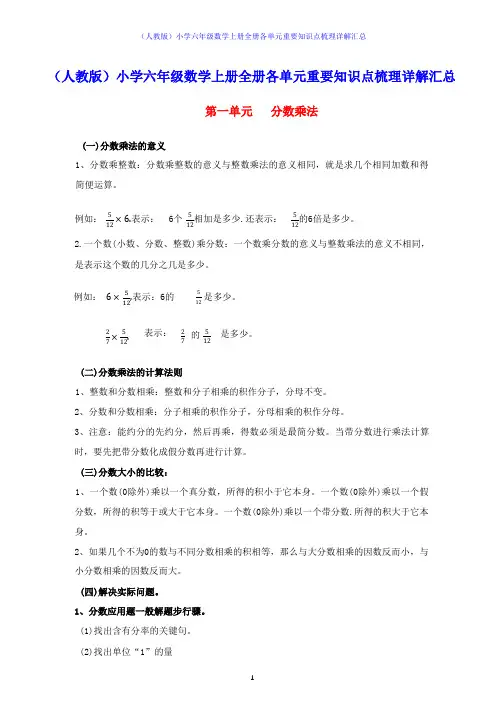
(人教版)小学六年级数学上册全册各单元重要知识点梳理详解汇总第一单元 分数乘法(一)分数乘法的意义1、分数乘整数:分数乘整数的意义与整数乘法的意义相同,就是求几个相同加数和得简便运算。
例如:512×6.表示: 6个512相加是多少.还表示:512的6倍是多少。
2.一个数(小数、分数、整数)乘分数:一个数乘分数的意义与整数乘法的意义不相同,是表示这个数的几分之几是多少。
(二)分数乘法的计算法则1、整数和分数相乘:整数和分子相乘的积作分子,分母不变。
2、分数和分数相乘:分子相乘的积作分子,分母相乘的积作分母。
3、注意:能约分的先约分,然后再乘,得数必须是最简分数。
当带分数进行乘法计算时,要先把带分数化成假分数再进行计算。
(三)分数大小的比较:1、一个数(0除外)乘以一个真分数,所得的积小于它本身。
一个数(0除外)乘以一个假分数,所得的积等于或大于它本身。
一个数(0除外)乘以一个带分数.所得的积大于它本身。
2、如果几个不为0的数与不同分数相乘的积相等,那么与大分数相乘的因数反而小,与小分数相乘的因数反而大。
(四)解决实际问题。
1、分数应用题一般解题步行骤。
(1)找出含有分率的关键句。
(2)找出单位“1”的量512 例如:6×512,表示:6的是多少。
的27×512.27 表示: 512 是多少。
(3)根据线段图写出等量关系式:单位“1”的量×对应分率=对应量。
(4)根据已知条件和问题列式解答。
2、乘法应用题有关注意概念。
(1)乘法应用题的解题思路:已知一个数、求这个数的几分之几是多少?(2)找单位“1”的方法:从含有分数的关键句中找.注意“的”前“比”后的规则。
当句子中的单位“1”不明显时,把原来的量看做单位“1”。
(3)甲比乙多几分之几表示甲比乙多的数占乙的几分之几,甲比乙少几分之几表示甲比乙少数占乙的几分之几。
(4)在应用题中如:小湖村去年水稻的亩产量是750千克,今年水稻的亩产量是800千克,增产几分之几?题目中的“增产”是多的意思.那么谁比谁多,应该是“多比少多”,“多”的是指800千克.“少”的是指750千克.即800千克比750千克多几分之几,结合应用题的表达方式,可以补充为“今年水稻的亩产量比去年水稻的亩产量多几分之几?”(5)“增加”、“提高”、“增产”等蕴含“多”的意思,“减少”、“下降”、“裁员”等蕴含“少”的意思,“相当于”、“占”、“是”、“等于”意思相近。

最新人教版六年级上册数学知识点归纳与整理一、整数与分数整数:由正整数、零以及负整数组成的数集。
分数:整数部分与分数部分组成的数。
1. 整数运算规则:- 整数加减法:正数加正数得正数,负数加负数得负数,正数加负数看绝对值大小;正数减正数看绝对值大小,负数减正数变为加法。
- 整数乘法:同号得正,异号得负。
- 整数除法:正数除以正数得正,负数除以负数得正,负数除以正数得负,0除以任何数得0。
2. 分数运算规则:- 分数的加减法:分母相同,直接加减分子;分母不同,通分后加减。
- 分数的乘法:分子相乘,分母相乘。
- 分数的除法:将除法转化为乘法,将被除数乘以倒数。
二、小数的认识与运算小数:整数部分和小数部分组成的数。
1. 小数的读法与写法:- 以小数点作为整数部分与小数部分的分隔符,读作十几点几几。
- 小数的百分数形式:小数部分乘以100加上百分号。
2. 小数的运算规则:- 小数的加减法:小数点对齐,按照整数加减法的规则进行运算。
- 小数的乘法:先将小数去掉小数点,进行整数的乘法运算,再根据小数位数确定小数点位置。
- 小数的除法:先将除数与被除数都乘以相同的10的倍数,使除数变为整数,再进行整数的除法运算,最后确定小数点位置。
三、图形的认识与分类1. 点、线段、射线、直线的概念与表示方法。
2. 四边形:正方形、长方形、菱形、梯形等的定义与特点。
3. 三角形:等腰三角形、直角三角形、等边三角形的定义与特点。
4. 圆的认识:圆心、半径、直径、圆周的定义与关系。
四、长度、面积与体积单位换算1. 长度单位换算:- 换算关系:1千米(km) = 1000米(m) = 10000分米(dm) = 100000厘米(cm) = 1000000毫米(mm)2. 面积单位换算:- 换算关系:1平方千米(km²) = 1000000平方米(m²) = 100000000平方分米(dm²) = 10000000000平方厘米(cm²) = 1000000000000平方毫米(mm²)3. 体积单位换算:- 换算关系:1立方千米(km³) = 1000000000立方米(m³) = 1000000000000立方分米(dm³) = 1000000000000000立方厘米(cm³) = 1000000000000000000立方毫米(mm³)五、时间与钟表1. 时间单位换算:- 换算关系:1小时(h) = 60分钟(min) = 3600秒(s)2. 24小时制与12小时制的转换规则和表示方法。
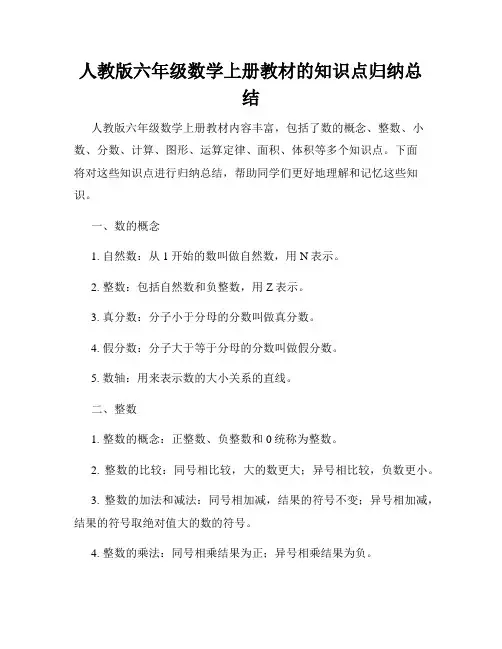
人教版六年级数学上册教材的知识点归纳总结人教版六年级数学上册教材内容丰富,包括了数的概念、整数、小数、分数、计算、图形、运算定律、面积、体积等多个知识点。
下面将对这些知识点进行归纳总结,帮助同学们更好地理解和记忆这些知识。
一、数的概念1. 自然数:从1开始的数叫做自然数,用N表示。
2. 整数:包括自然数和负整数,用Z表示。
3. 真分数:分子小于分母的分数叫做真分数。
4. 假分数:分子大于等于分母的分数叫做假分数。
5. 数轴:用来表示数的大小关系的直线。
二、整数1. 整数的概念:正整数、负整数和0统称为整数。
2. 整数的比较:同号相比较,大的数更大;异号相比较,负数更小。
3. 整数的加法和减法:同号相加减,结果的符号不变;异号相加减,结果的符号取绝对值大的数的符号。
4. 整数的乘法:同号相乘结果为正;异号相乘结果为负。
5. 整数的除法:两个整数相除,商的符号与被除数和除数的符号相同。
三、小数1. 小数的概念:整数和小数点后的数字组成的数。
2. 小数的读法:按位读出小数点前的数字,小数点后的数字按位数读。
3. 小数的比较:同样位数的小数,从左至右比较每一位的大小。
4. 小数的加法和减法:按位对齐,从右到左进行加减运算。
5. 小数的乘法和除法:按照整数运算法则进行计算,最后保留相应的小数位数。
四、分数1. 分数的概念:一个整数除以一个非零的整数所得的数。
2. 分数的分类:真分数和假分数。
3. 分数的化简:将分子和分母的公约数都除掉,得到最简分数。
4. 分数的加法和减法:分母相同,直接加减分子;分母不同,通分后再进行加减运算。
5. 分数的乘法:分子乘以分子,分母乘以分母,得到的新分数即为乘积。
6. 分数的除法:将除数倒转,变成乘法运算。
五、图形1. 正方形:四条边相等且四个角都是直角的四边形。
2. 长方形:相邻两边相等且四个角都是直角的四边形。
3. 三角形:有三条边和三个角的多边形。
4. 直角三角形:一个角为直角的三角形。
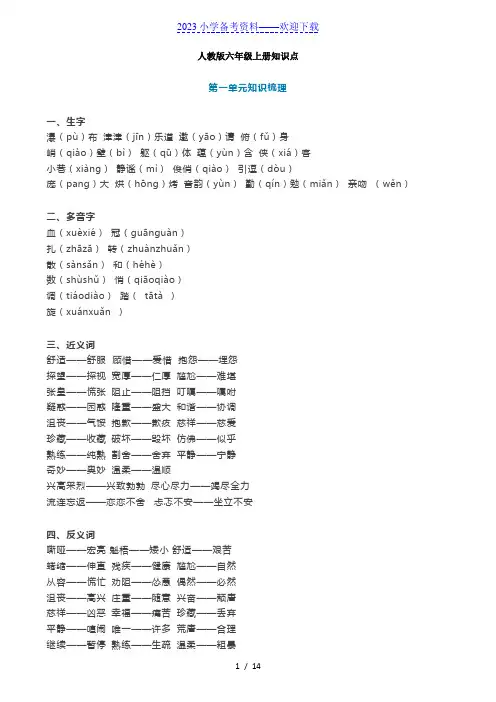
人教版六年级上册知识点第一单元知识梳理一、生字瀑(pù)布津津(jīn)乐道邀(yāo)请俯(fǔ)身峭(qiào)壁(bì)躯(qū)体蕴(yùn)含侠(xiá)客小巷(xiàng)静谧(mì)俊俏(qiào)引逗(dòu)庞(pang)大烘(hōng)烤音韵(yùn)勤(qín)勉(miǎn)亲吻(wěn)二、多音字血(xuèxié)冠(guānguàn)扎(zhāzā)转(zhuànzhuǎn)散(sànsǎn)和(héhè)数(shùshǔ)悄(qiāoqiào)调(tiáodiào)踏(tātà)旋(xuánxuǎn )三、近义词舒适——舒服顾惜——爱惜抱怨——埋怨探望——探视宽厚——仁厚尴尬——难堪张皇——慌张阻止——阻挡叮嘱——嘱咐疑惑——困惑隆重——盛大和谐——协调沮丧——气馁抱歉——歉疚慈祥——慈爱珍藏——收藏破坏——毁坏仿佛——似乎熟练——纯熟割舍——舍弃平静——宁静奇妙——奥妙温柔——温顺兴高采烈——兴致勃勃尽心尽力——竭尽全力流连忘返——恋恋不舍忐忑不安——坐立不安四、反义词嘶哑——宏亮魁梧——矮小舒适——艰苦蜷缩——伸直残疾——健康尴尬——自然从容——慌忙劝阻——怂恿偶然——必然沮丧——高兴庄重——随意兴奋——颓唐慈祥——凶恶幸福——痛苦珍藏——丢弃平静——喧闹唯一——许多荒唐——合理继续——暂停熟练——生疏温柔——粗暴悦耳——难听耐心——急躁熟悉——陌生兴高采烈——无精打采流连忘返—归心似箭忐忑不安——镇定自若五、词语积累年过花甲德高望重津津乐道别有深意左冲右撞意味深长庞然大物行色匆匆奇妙无比不拘一格【表示绿色的词语】墨绿豆绿草绿深绿暗绿碧绿浅绿淡绿翠绿嫩绿橄榄绿一碧千里苍翠欲滴翠色欲流千山一碧碧波荡漾绿草如茵【描写雨的词语】暴风骤雨倾盆大雨大雨滂沱牛毛细雨蒙蒙细雨和风细雨【与昆虫有关的】螳臂当车金蝉脱壳飞蛾扑火噤若寒蝉蜻蜓点水蜂拥而来【含有反义词的】左冲右撞黑白相间前赴后继横七竖八上天入地【ABCC式】行色匆匆小心翼翼千里迢迢大腹便便神采奕奕【AABB式】熙熙攘攘浑浑噩噩纷纷扬扬洋洋洒洒浩浩荡荡六、词语搭配(波涛的)轰鸣(清新的)海风(狂风的)怒吼(撕破的)渔网(瘦小的)脸(唯一的)听众(隆重的)仪式(诗一般的)语言(独享的)幽静(慈祥的)眼神(奇妙的)电话(受伤的)手指(可爱的)小鸟(纸条上的)留言(温柔的)嗓音(泰然地)坐下(宽厚地)笑(无奈地)摇头(心跳得)厉害(飞快地)跑七、积累句型第2课山雨1.比喻句:(1)像一曲无字的歌谣,神奇地从四面八方飘然而起,逐渐清晰起来,响亮起来,由远而近,由远而近……(2)雨声里,山中的每一块岩石、每一片树叶、每一丛绿草,都变成了奇妙无比的琴键。
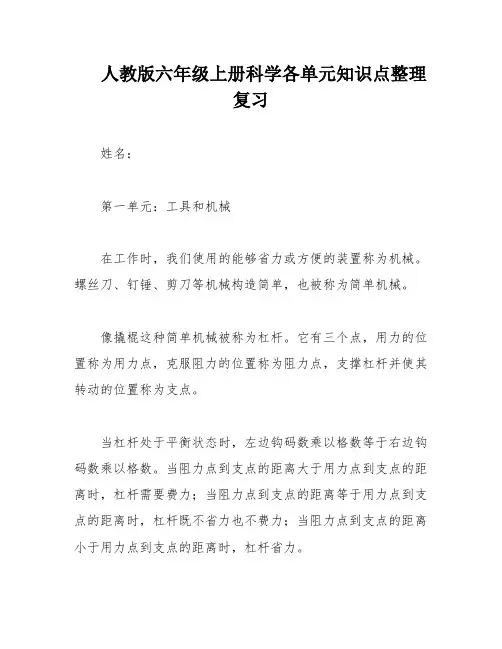
人教版六年级上册科学各单元知识点整理复习姓名:第一单元:工具和机械在工作时,我们使用的能够省力或方便的装置称为机械。
螺丝刀、钉锤、剪刀等机械构造简单,也被称为简单机械。
像撬棍这种简单机械被称为杠杆。
它有三个点,用力的位置称为用力点,克服阻力的位置称为阻力点,支撑杠杆并使其转动的位置称为支点。
当杠杆处于平衡状态时,左边钩码数乘以格数等于右边钩码数乘以格数。
当阻力点到支点的距离大于用力点到支点的距离时,杠杆需要费力;当阻力点到支点的距离等于用力点到支点的距离时,杠杆既不省力也不费力;当阻力点到支点的距离小于用力点到支点的距离时,杠杆省力。
像水龙头这样,轮和轴固定在一起,可以转动的机械被称为轮轴。
固定在一个位置转动而不移动的滑轮被称为定滑轮,可以随重物一起移动的滑轮被称为动滑轮。
将动滑轮和定滑轮组合在一起使用,就形成了滑轮组。
像汽车车厢上搭的木板一样的简单机械被称为斜面。
斜面的坡度越小,在斜面上提升物体所需的力就越小;斜面的坡度越大,在斜面上提升物体所需的力就越大。
螺钉的螺纹越密,旋入时就越省力。
链条与两个齿轮啮合,起到传递动力的作用,使自行车运动。
以下是各种简单机械的比较:简单机械杠杆轮轴斜面省力杠杆不省力也不费力费力杠杆以下是各类型滑轮:滑轮类型定滑轮动滑轮滑轮组作用改变用力方向,不省力。
省力,不能改变用力方向。
既省力又改变用力方向。
应用机械的类型杠杆轮轴杠杆应用起重机吊钩上的滑轮起重机上的滑轮跷跷板、天平应用机械的位置车轮和车轴后架上的弹簧夹水龙头、门把手、方向盘、扳手拧螺帽、螺丝刀拧螺丝、辘轳以下是一些举例:开瓶器、切刀、核桃夹、订书机、羊角锤、老虎钳13、自行车上的各部分应用了哪种简单机械?应用机械的位置车把手刹车大齿轮和小齿轮车铃的按钮第二单元:形状与结构文章中没有明显的格式错误或需要删除的段落,因此不做改动)1.建筑中的材料柱子和横梁是支撑房屋和桥梁的重要元素。
为增强横梁的抗弯曲能力,需要考虑材料的宽度和厚度。
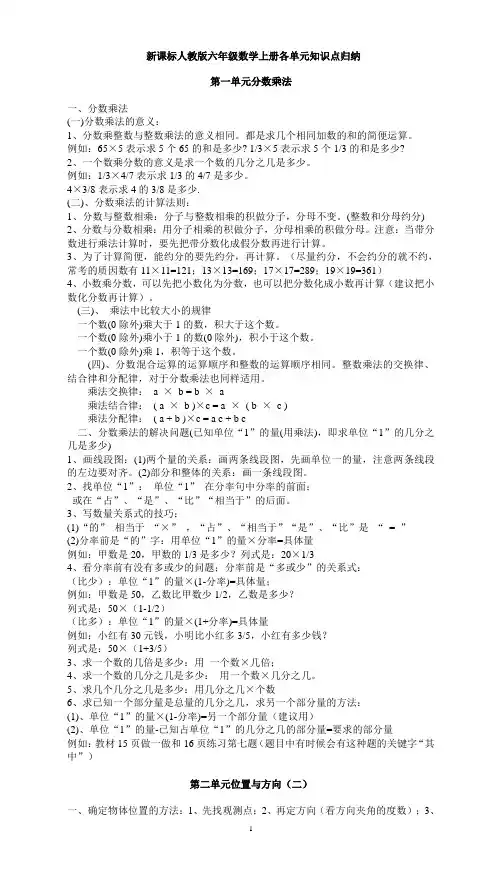
新课标人教版六年级数学上册各单元知识点归纳第一单元分数乘法一、分数乘法(一)分数乘法的意义:1、分数乘整数与整数乘法的意义相同。
都是求几个相同加数的和的简便运算。
例如:65×5表示求5个65的和是多少? 1/3×5表示求5个1/3的和是多少?2、一个数乘分数的意义是求一个数的几分之几是多少。
例如:1/3×4/7表示求1/3的4/7是多少。
4×3/8表示求4的3/8是多少.(二)、分数乘法的计算法则:1、分数与整数相乘:分子与整数相乘的积做分子,分母不变。
(整数和分母约分)2、分数与分数相乘:用分子相乘的积做分子,分母相乘的积做分母。
注意:当带分数进行乘法计算时,要先把带分数化成假分数再进行计算。
3、为了计算简便,能约分的要先约分,再计算。
(尽量约分,不会约分的就不约,常考的质因数有11×11=121;13×13=169;17×17=289;19×19=361)4、小数乘分数,可以先把小数化为分数,也可以把分数化成小数再计算(建议把小数化分数再计算)。
(三)、乘法中比较大小的规律一个数(0除外)乘大于1的数,积大于这个数。
一个数(0除外)乘小于1的数(0除外),积小于这个数。
一个数(0除外)乘1,积等于这个数。
(四)、分数混合运算的运算顺序和整数的运算顺序相同。
整数乘法的交换律、结合律和分配律,对于分数乘法也同样适用。
乘法交换律: a × b = b × a乘法结合律:( a × b )×c = a ×( b × c )乘法分配律:( a + b )×c = a c + b c二、分数乘法的解决问题(已知单位“1”的量(用乘法),即求单位“1”的几分之几是多少)1、画线段图:(1)两个量的关系:画两条线段图,先画单位一的量,注意两条线段的左边要对齐。
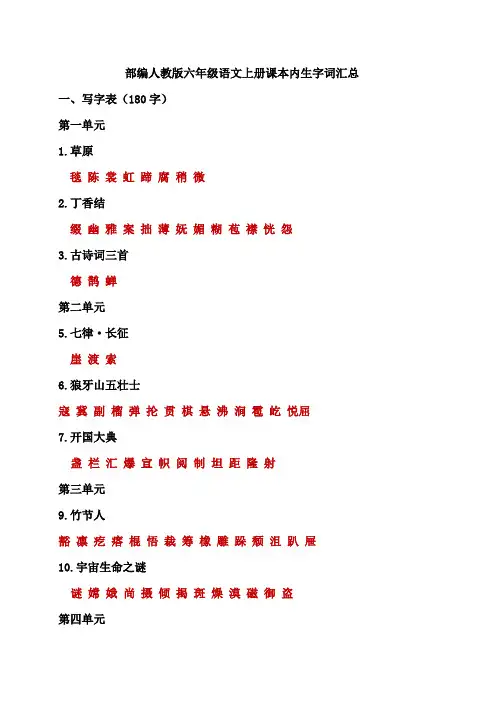
部编人教版六年级语文上册课本内生字词汇总一、写字表(180字)第一单元1.草原毯陈裳虹蹄腐稍微2.丁香结缀幽雅案拙薄妩媚糊苞襟恍怨3.古诗词三首德鹊蝉第二单元5.七律·长征崖渡索6.狼牙山五壮士寇冀副榴弹抡贯棋悬沸涧雹屹悦屈7.开国大典盏栏汇爆宣帜阅制坦距隆射第三单元9.竹节人豁凛疙瘩棍悟裁筹橡雕跺颓沮趴屉10.宇宙生命之谜谜嫦娥尚摄倾揭斑燥漠磁御盗第四单元12.桥咆哮嗓淌哑揪呻废13.穷人汹涌澎湃溅熄掀困唉淋嘿糟嘛皱勺第五单元15.夏天里的成长棚苔藓坪蔗瀑缝谚16.盼袖篷缩疯瓦甩嚷酱炖唇蹦梯第六单元17.古诗三首簸涯莺18.只有一个地球莹裹篮蔼资慷慨贡滥基睹第七单元21.文言文两则哉巍弦轴锦曝矣22.月光曲谱莱茵盲纯键缕陶第八单元24.少年闰土胯郑拜租厨毡羞撒缚猬伶俐窜25.好的故事搁综澄萍藻漾焰削瞬凝骤掷陡一、词语表第一单元1.草原绿毯线条柔美惊叹回味乐趣目的地洒脱衣裳彩虹马蹄热乎乎奶豆腐礼貌拘束举杯感人会心微笑2.丁香结宅院幽雅伏案浑浊笨拙参差眼帘单薄照耀文思梦想迷蒙妩媚模糊花苞衣襟恍然愁怨顺心平淡第二单元6.狼牙山五壮士日寇奋战险要手榴弹全神贯注悬崖斩钉截铁热血沸腾攀登居高临下山涧粉身碎骨雹子屹立眺望喜悦壮烈豪迈不屈惊天动地7.开国大典协商汇集预定爆发排山倒海宣布就位宣告雄伟肃静旗帜语调完毕检阅制服坦克一致距离高潮次序第三单元9.竹节人威风凛凛疙瘩疲倦呆头呆脑冰棍别出心裁技高一筹橡皮跺脚大步流星颓然暴露无遗沮丧念念有词忘乎所以心满意足轻手轻脚10.宇宙生命之谜发达理论类似猜测起源适当提供能源倾角昼夜揭开神秘观测拍摄斑点枯萎干燥沙漠磁场抵御考察系列第四单元12.桥咆哮惊慌嗓子跌跌撞撞拥戴沙哑党员呻吟废话吞没猛然搀扶13.穷人渔夫汹涌澎湃轰鸣心惊肉跳沉思风暴抱怨倾听探望照顾困难阴冷自作自受湿淋淋渔网糟糕忧虑第五单元15.夏天里的成长活生生苔藓草坪甘蔗瀑布软绵绵谚语农作物尽量16.盼斗篷情况袖子瓦蓝预报遮盖讲座油锅酱油闹钟逗引嘴唇楼梯第六单元18.只有一个地球晶莹摇篮壮观和蔼资源有限无私慷慨节制枯竭贡献毁坏滥用生态设想例如基地破碎目睹子孙第七单元22.月光曲谱写钢琴幽静断断续续茅屋烛光失明纯熟清幽琴键景象陶醉第八单元24.少年闰土一望无际家景郑重贡品祭器讲究盼望厨房毡帽项圈刺猬伶俐经历潮汛25.好的故事预告烟草烟雾昏沉错综澄碧萍藻荡漾解散退缩瘦削浮动瞬间凝视骤然凌乱陡然附:部编人教版六年级语文上册第七单元知识小结文言文二则一、我会写组词哉:zāi(美哉、善哉、呜呼哀哉)巍:wēi(巍峨、巍然、巍巍)弦:xián(琴弦、弦乐器、扣人心弦)轴:zhóu(线轴、轴心、中轴线)锦:jǐn(锦缎、锦绣、锦鸡)曝:pù(曝露、曝晒、一曝十寒)矣:yǐ(悔之晚矣、由来久矣)二、多音字斗:dòu(争斗)dǒu(斗胆)曝:pù(曝晒)bào(曝光)角:jiǎo(角落)jué(角色)三、课文翻译伯牙鼓琴[注释]①鼓:弹。
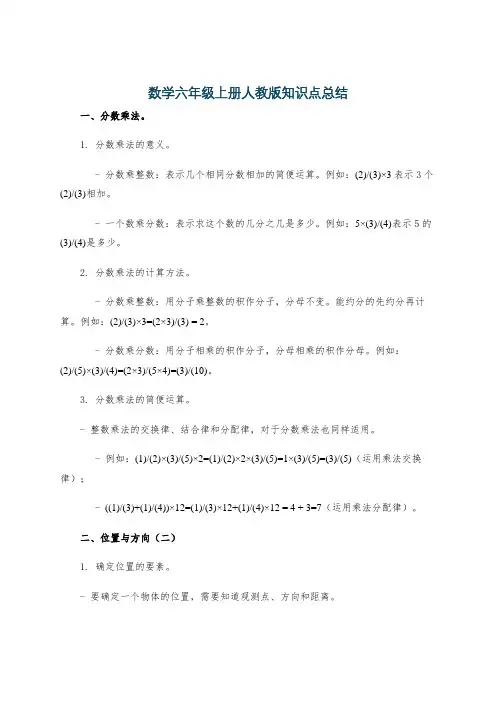
数学六年级上册人教版知识点总结一、分数乘法。
1. 分数乘法的意义。
- 分数乘整数:表示几个相同分数相加的简便运算。
例如:(2)/(3)×3表示3个(2)/(3)相加。
- 一个数乘分数:表示求这个数的几分之几是多少。
例如:5×(3)/(4)表示5的(3)/(4)是多少。
2. 分数乘法的计算方法。
- 分数乘整数:用分子乘整数的积作分子,分母不变。
能约分的先约分再计算。
例如:(2)/(3)×3=(2×3)/(3) = 2。
- 分数乘分数:用分子相乘的积作分子,分母相乘的积作分母。
例如:(2)/(5)×(3)/(4)=(2×3)/(5×4)=(3)/(10)。
3. 分数乘法的简便运算。
- 整数乘法的交换律、结合律和分配律,对于分数乘法也同样适用。
- 例如:(1)/(2)×(3)/(5)×2=(1)/(2)×2×(3)/(5)=1×(3)/(5)=(3)/(5)(运用乘法交换律);- ((1)/(3)+(1)/(4))×12=(1)/(3)×12+(1)/(4)×12 = 4 + 3=7(运用乘法分配律)。
二、位置与方向(二)1. 确定位置的要素。
- 要确定一个物体的位置,需要知道观测点、方向和距离。
- 例如,以学校为观测点,图书馆在学校东偏北30^∘方向,距离学校500米处。
2. 描述路线图。
- 描述路线图时,要按照行走的路线,依次描述出每一段的方向和距离。
- 例如,从家出发,先向东走300米到超市,再从超市向南偏东45^∘方向走400米到公园。
三、分数除法。
1. 分数除法的意义。
- 分数除法是分数乘法的逆运算。
已知两个因数的积与其中一个因数,求另一个因数的运算。
例如:如果(2)/(3)× x=(4)/(9),那么x=(4)/(9)÷(2)/(3)。
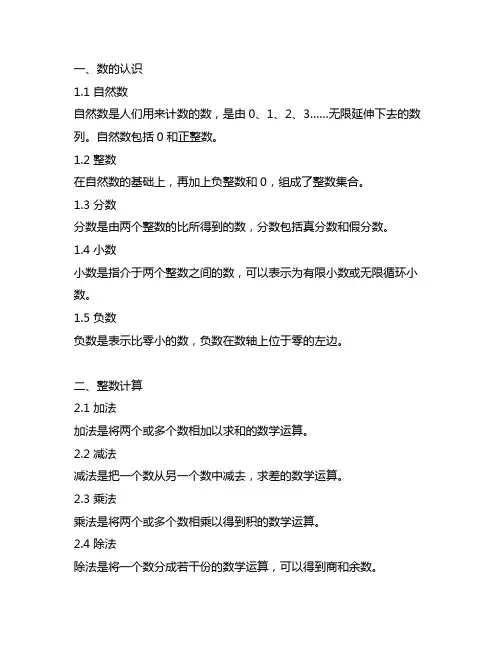
一、数的认识1.1 自然数自然数是人们用来计数的数,是由0、1、2、3……无限延伸下去的数列。
自然数包括0和正整数。
1.2 整数在自然数的基础上,再加上负整数和0,组成了整数集合。
1.3 分数分数是由两个整数的比所得到的数,分数包括真分数和假分数。
1.4 小数小数是指介于两个整数之间的数,可以表示为有限小数或无限循环小数。
1.5 负数负数是表示比零小的数,负数在数轴上位于零的左边。
二、整数计算2.1 加法加法是将两个或多个数相加以求和的数学运算。
2.2 减法减法是把一个数从另一个数中减去,求差的数学运算。
2.3 乘法乘法是将两个或多个数相乘以得到积的数学运算。
2.4 除法除法是将一个数分成若干份的数学运算,可以得到商和余数。
2.5 整数的加减乘除混合运算整数的混合运算包括加减混合运算、乘除混合运算等,需要遵循“先乘除后加减”的运算法则。
三、分数3.1 分数的加法分数的加法是求两个分数的和,通过通分后进行分子相加得到结果。
3.2 分数的减法分数的减法是求两个分数的差,通过通分后进行分子相减得到结果。
3.3 分数的乘法分数的乘法是求两个分数的积,通过分子相乘分母相乘得到结果。
3.4 分数的除法分数的除法是求两个分数的商,通过将除法转化为乘法,然后进行分子相乘分母相乘得到结果。
四、小数4.1 小数的加减法小数的加减法是通过小数点对齐后进行个位、十分位、百分位等相应位数的数值相加或相减得到结果。
4.2 小数的乘除法小数的乘法是将小数进行数位对齐,然后进行普通的数乘运算,最后根据位数进行小数点的位置确定。
4.3 小数的整数乘法小数的整数乘法是通过整数与小数相乘,然后移动小数点相应位数得到结果。
4.4 小数的整数除法小数的整数除法是通过将小数乘以适当的倍数使其成为整数,然后进行整数除法运算,最后根据小数点的位置确定。
五、图形和分数5.1 长方形和平行四边形长方形和平行四边形是最基本的四边形图形,其面积计算公式为底边乘以高度。
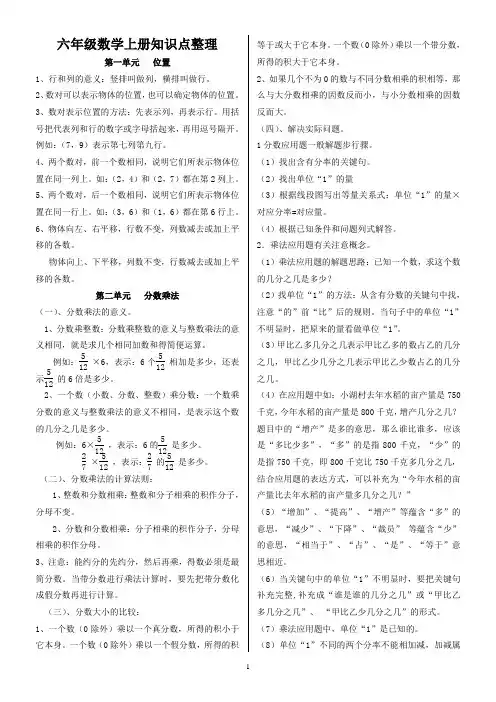
六年级数学上册知识点整理第一单元位置1、行和列的意义:竖排叫做列,横排叫做行。
2、数对可以表示物体的位置,也可以确定物体的位置。
3、数对表示位置的方法:先表示列,再表示行。
用括号把代表列和行的数字或字母括起来,再用逗号隔开。
例如:(7,9)表示第七列第九行。
4、两个数对,前一个数相同,说明它们所表示物体位置在同一列上。
如:(2,4)和(2,7)都在第2列上。
5、两个数对,后一个数相同,说明它们所表示物体位置在同一行上。
如:(3,6)和(1,6)都在第6行上。
6、物体向左、右平移,行数不变,列数减去或加上平移的各数。
物体向上、下平移,列数不变,行数减去或加上平移的各数。
第二单元分数乘法(一)、分数乘法的意义。
1、分数乘整数:分数乘整数的意义与整数乘法的意义相同,就是求几个相同加数和得简便运算。
例如:512×6,表示:6个512相加是多少,还表示512的6倍是多少。
2、一个数(小数、分数、整数)乘分数:一个数乘分数的意义与整数乘法的意义不相同,是表示这个数的几分之几是多少。
例如:6×512,表示:6的512是多少。
2 7×512,表示:27的512是多少。
(二)、分数乘法的计算法则:1、整数和分数相乘:整数和分子相乘的积作分子,分母不变。
2、分数和分数相乘:分子相乘的积作分子,分母相乘的积作分母。
3、注意:能约分的先约分,然后再乘,得数必须是最简分数。
当带分数进行乘法计算时,要先把带分数化成假分数再进行计算。
(三)、分数大小的比较:1、一个数(0除外)乘以一个真分数,所得的积小于它本身。
一个数(0除外)乘以一个假分数,所得的积等于或大于它本身。
一个数(0除外)乘以一个带分数,所得的积大于它本身。
2、如果几个不为0的数与不同分数相乘的积相等,那么与大分数相乘的因数反而小,与小分数相乘的因数反而大。
(四)、解决实际问题。
1分数应用题一般解题步行骤。
(1)找出含有分率的关键句。
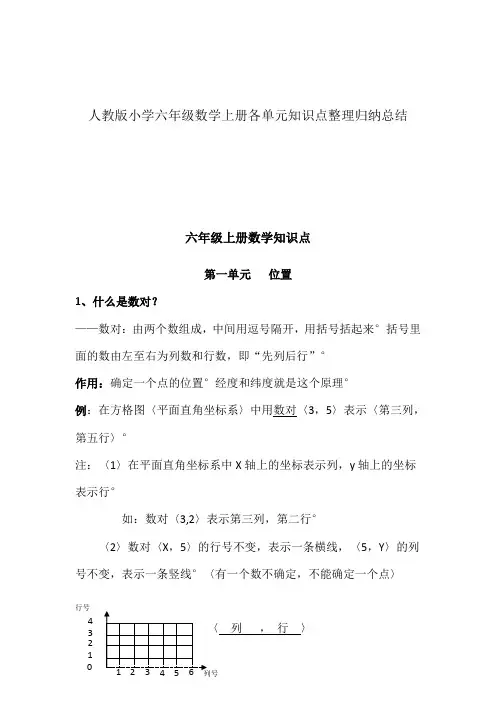
人教版小学六年级数学上册各单元知识点整理归纳总结六年级上册数学知识点第一单元 位置1、什么是数对? ——数对:由两个数组成,中间用逗号隔开,用括号括起来°括号里面的数由左至右为列数和行数,即“先列后行”° 作用:确定一个点的位置°经度和纬度就是这个原理° 例:在方格图〈平面直角坐标系〉中用数对〈3,5〉表示〈第三列,第五行〉°注:〈1〉在平面直角坐标系中X 轴上的坐标表示列,y 轴上的坐标表示行°如:数对〈3,2〉表示第三列,第二行°〈2〉数对〈X ,5〉的行号不变,表示一条横线,〈5,Y 〉的列号不变,表示一条竖线°〈有一个数不确定,不能确定一个点〉〈 列 , 行 〉 3 4行号↓ ↓竖排叫列 横排叫行〈从左往右看〉〈从下往上看〉〈从前往后看〉2、图形左右平移行数不变;图形上下平移列数不变°3、两点间的距离与基准点〈0,0〉的选择无关,基准点不同导致数对不同,两点间但距离不变°第二单元 分数乘法〈一〉分数乘法意义:1、分数乘整数的意义与整数乘法的意义相同,就是求几个相同加数的和的简便运算°注:“分数乘整数”指的是第二个因数必须是整数,不能是分数° 例如:53×7表示: 求7个53的和是多少? 或表示:53的7倍是多少?2、一个数乘分数的意义就是求一个数的几分之几是多少°注:“一个数乘分数”指的是第二个因数必须是分数,不能是整数°〈第一个因数是什么都可以〉 例如:53×61表示: 求53的61是多少?9 ×61表示: 求9的61是多少? A × 61表示: 求a 的61是多少?〈二〉分数乘法计算法则:1、分数乘整数的运算法则是:分子与整数相乘,分母不变°注:〈1〉为了计算简便能约分的可先约分再计算°〈整数和分母约分〉〈2〉约分是用整数和下面的分母约掉最大公因数°〈整数千万不能与分母相乘,计算结果必须是最简分数〉2、分数乘分数的运算法则是:用分子相乘的积做分子,分母相乘的积做分母°〈分子乘分子,分母乘分母〉注:〈1〉如果分数乘法算式中含有带分数,要先把带分数化成假分数再计算°〈2〉分数化简的方法是:分子、分母同时除以它们的最大公因数°〈3〉在乘的过程中约分,是把分子、分母中,两个可以约分的数先划去,再分别在它们的上、下方写出约分后的数°〈约分后分子和分母必须不再含有公因数,这样计算后的结果才是最简单分数〉〈4〉分数的基本性质:分子、分母同时乘或者除以一个相同的数〈0除外〉,分数的大小不变°〈三〉积与因数的关系:一个数〈0除外〉乘大于1的数,积大于这个数°a×b=c,当b >1时,c>a.一个数〈0除外〉乘小于1的数,积小于这个数°a ×b=c,当b <1时,c<a (b ≠0).一个数〈0除外〉乘等于1的数,积等于这个数°a ×b=c,当b =1时,c=a .注:在进行因数与积的大小比较时,要注意因数为0时的特殊情况° 附:形如)(1b a a +⨯的分数可折成〈b a a +-11〉×b1 〈四〉分数乘法混合运算1、分数乘法混合运算顺序与整数相同,先乘、除后加、减,有括号的先算括号里面的,再算括号外面的°2、整数乘法运算定律对分数乘法同样适用;运算定律可以使一些计算简便°乘法交换律:a×b=b×a乘法结合律:(a×b)×c=a×(b×c)乘法分配律:a×(b±c)=a×b±a×c〈五〉倒数的意义:乘积为1的两个数互为倒数°1、倒数是两个数的关系,它们互相依存,不能单独存在°单独一个数不能称为倒数°〈必须说清谁是谁的倒数〉2、判断两个数是否互为倒数的唯一标准是:两数相乘的积是否为“1”°例如:a×b=1则a 、b 互为倒数°3、求倒数的方法:①求分数的倒数:交换分子、分母的位置°②求整数的倒数:整数分之1°③求带分数的倒数:先化成假分数,再求倒数°④求小数的倒数:先化成分数再求倒数°4、1的倒数是它本身,因为1×1=10没有倒数,因为任何数乘0积都是0,且0不能作分母°5、任意数a(a ≠0),它的倒数为a 1;非零整数a 的倒数为a 1;分数a b 的倒数是b a °6、真分数的倒数是假分数,真分数的倒数大于1,也大于它本身° 假分数的倒数小于或等于1°带分数的倒数小于1°〈六〉分数乘法应用题 ——用分数乘法解决问题1、求一个数的几分之几是多少?〈用乘法〉“1”× a b = ?例如:求25的53是多少? 列式:25×53=15甲数的53等于乙数,已知甲数是25,求乙数是多少? 列式:25×53=15 注:已知单位“1”的量,求单位“1”的量的几分之几是多少,用单位“1”的量与分数相乘°2、〈 什么〉是〈什么 〉的)()(几几° 〈 〉= ( “1” ) ×)()(几几 例1: 已知甲数是乙数的53,乙数是25,求甲数是多少?甲数= 乙数 ×53 即25×53=15注:〈1〉“是”“的”字中间的量“乙数”是53的单位“1”的量,即53是把乙数看作单位“1”,把乙数平均分成5份,甲数是其中的3份°〈2〉“是”“占”“比”这三个字都相当于“=”号,“的”字相当于“×”°〈3〉单位“1”的量×分率=分率对应的量例2:甲数比乙数多〈少〉53,乙数是25,求甲数是多少? 甲数=乙数 ±乙数×53 即25±25×53=25×〈1±53〉=40〈或10〉3、巧找单位“1”的量:在含有分数〈分率〉的语句中,分率前面的量就是单位“1”对应的量,或者“占”“是”“比”字后面的量是单位“1”°4、什么是速度?——速度是单位时间内行驶的路程°速度=路程÷时间 时间=路程÷速度 路程=速度×时间——单位时间指的是1小时1分钟1秒等这样的大小为1的时间单位,每分钟、每小时、每秒钟等°5、求甲比乙多〈少〉几分之几?多:〈甲-乙〉÷乙 = 比字后面的量乙)—甲( 少:〈乙-甲〉÷乙第三单元 分数除法一、分数除法的意义:分数除法是分数乘法的逆运算,已知两个数的积与其中一个因数,求另一个因数的运算°二、分数除法计算法则:除以一个数〈0除外〉,等于乘上这个数的倒数°1、被除数÷除数=被除数×除数的倒数°例53÷3=53×31=51 3÷53=3×35=5 2、除法转化成乘法时,被除数一定不能变,“÷”变成“×”,除数变成它的倒数°3、分数除法算式中出现小数、带分数时要先化成分数、假分数再计算°4、被除数与商的变化规律:①除以大于1的数,商小于被除数:a÷b=c 当b>1时,c<a (a ≠0)=比后差②除以小于1的数,商大于被除数:a÷b=c 当b<1时,c>a (a ≠0 b ≠0) ③除以等于1的数,商等于被除数:a÷b=c 当b=1时,c=a三、分数除法混合运算1、混合运算用梯等式计算,等号写在第一个数字的左下角°2、运算顺序:①连除:属同级运算,按照从左往右的顺序进行计算;或者先把所有除法转化成乘法再计算;或者依据“除以几个数,等于乘上这几个数的积”的简便方法计算°加、减法为一级运算,乘、除法为二级运算° ②混合运算:没有括号的先乘、除后加、减,有括号的先算括号里面,再算括号外面°注:〈a±b 〉÷c=a÷c±b÷c四、比:两个数相除也叫两个数的比1、比式中,比号〈∶〉前面的数叫前项,比号后面的项叫做后项,比号相当于除号,比的前项除以后项的商叫做比值°注:连比如:3:4:5读作:3比4比52、比表示的是两个数的关系,可以用分数表示,写成分数的形式,读作几比几°例:122012=12÷20=53=0.6 12∶20读作:12比20 注:区分比和比值:比值是一个数,通常用分数表示,也可以是整数、小数°后项 前项 前项 后项 比号 比值比是一个式子,表示两个数的关系,可以写成比,也可以写成分数的形式°3、比的基本性质:比的前项和后项同时乘以或除以相同的数〈0除外〉,比值不变°4、化简比:化简之后结果还是一个比,不是一个数°〈1〉、用比的前项和后项同时除以它们的最大公约数°〈2〉、两个分数的比,用前项后项同时乘分母的最小公倍数,再按化简整数比的方法来化简°也可以求出比值再写成比的形式°〈3〉、两个小数的比,向右移动小数点的位置,也是先化成整数比°5、求比值:把比号写成除号再计算,结果是一个数〈或分数〉,相当于商,不是比°6、比和除法、分数的区别:附:商不变性质:被除数和除数同时乘或除以相同的数〈0除外〉,商不变°分数的基本性质:分子和分母同时乘或除以相同的数〈0除外〉,分数的大小不变°五、分数除法和比的应用1、已知单位“1”的量用乘法°例:甲是乙的53,乙是25,求甲是多少?即:甲=乙×53〈15×53=9〉 2、未知单位“1”的量用除法°例: 甲是乙的53,甲是15,求乙是多少?即:甲=乙×53〈15÷53=25〉〈建议列方程答〉 3、分数应用题基本数量关系〈把分数看成比〉〈1〉甲是乙的几分之几?甲=乙×几分之几 〈例:甲是15的53,求甲是多少?15×53=9〉乙=甲÷几分之几 〈例:9是乙的53,求乙是多少?9÷53=15〉 几分之几=甲÷乙 〈例:9是15的几分之几?9÷15=53〉〈“是”字相当“÷”号,乙是单位“1”〉〈2〉甲比乙多〈少〉几分之几?A 差÷乙=乙差〈“比”字后面的量是单位“1”的量〉 〈例:9比15少几分之几?〈15-9〉÷15=15915 =156=52〉B 多几分之几是:乙甲–1 〈例: 15比9少几分之几?15÷9=915-1=35–1=32〉 C 少几分之几是:1–乙甲 〈例:9比15少几分之几?1-9÷15=1–159=1–53=52〉 D 甲=乙±差=乙±乙×乙差=乙±乙×几几=乙〈1±几几〉 〈例:甲比15少52,求甲是多少?15–15×52=15×〈1–52〉=9〈多是“+”少是“–”〉E 乙=甲÷(1±几几 ) 〈例:9比乙少52,求乙是多少?9÷〈1-52〉=9 ÷53=15〉〈多是“+”少是“–”〉〈例:15比乙多32,求乙是多少?15÷〈1+32〉=15 ÷35=9〉〈多是“+”少是“–”〉4、按比例分配:把一个量按一定的比分配的方法叫做按比例分配° 例如:已知甲乙的和是56,甲、乙的比3∶5,求甲、乙分别是多少?方法一:56÷〈3+5〉=7 甲:3×7=21 乙:5×7=35 方法二:甲:56×533+=21 乙:56×535+=35 例如:已知甲是21,甲、乙的比3∶5,求乙是多少?方法一:21÷3=7 乙:5×7=35方法二:甲乙的和:21÷533+=56 乙:56×535+=35 方法三:甲÷乙=53 乙=甲÷53=21÷53=355、画线段图:〈1〉找出单位“1”的量,先画出单位“1”,标出已知和未知° 〈2〉分析数量关系°〈3〉找等量关系°〈4〉列方程°注:两个量的关系画两条线段图,部分和整体的关系画一条线段图°第四单元 圆一、.圆的特征1、圆是平面内封闭曲线围成的平面图形,.2、圆的特征:外形美观,易滚动°3、圆心o :圆中心的点叫做圆心.圆心一般用字母O 表示.圆多次对折之后,折痕的相交于圆的中心即圆心°圆心确定圆的位置°半径r :连接圆心到圆上任意一点的线段叫做半径°在同一个圆里,有无数条半径,且所有的半径都相等°半径确定圆的大小° 直径d: 通过圆心且两端都在圆上的线段叫做直径°在同一个圆里,有无数条直径,且所有的直径都相等°直径是圆内最长的线段°同圆或等圆内直径是半径的2倍:d=2r 或 r=d÷2=21d=2d 4、等圆:半径相等的圆叫做同心圆,等圆通过平移可以完全重合° 同心圆:圆心重合、半径不等的两个圆叫做同心圆°5、圆是轴对称图形:如果一个图形沿着一条直线对折,两侧的图形能够完全重合,这个图形是轴对称图形°折痕所在的直线叫做对称轴°有一条对称轴的图形:半圆、扇形、等腰梯形、等腰三角形、角有二条对称轴的图形:长方形有三条对称轴的图形:等边三角形有四条对称轴的图形:正方形有无条对称轴的图形:圆,圆环6、画圆〈1〉圆规两脚间的距离是圆的半径°〈2〉画圆步骤:定半径、定圆心、旋转一周°二、圆的周长:围成圆的曲线的长度叫做圆的周长,周长用字母C 表示°1、圆的周长总是直径的三倍多一些°2、圆周率:圆的周长与直径的比值是一个固定值,叫做圆周率,用字母π表示°周长=周长÷直径≈3.14即:圆周率π=直径所以,圆的周长(c)=直径(d)×圆周率(π) ——周长公式:c=πd, c=2πr 注:圆周率π是一个无限不循环小数,3.14是近似值°3、周长的变化的规律:半径扩大多少倍直径也扩大多少倍,周长扩大的倍数与半径、直径扩大的倍数相同°如果r1∶r2∶r3=d1∶d2∶d3=c1∶c2∶c31×2πr=πr+d4、半圆周长=圆周长一半+直径=2三、圆的面积s1、圆面积公式的推导如图把一个圆沿直径等分成若干份,剪开拼成长方形,份数越多拼成的图像越接近长方形°圆的半径= 长方形的宽圆的周长的一半= 长方形的长长方形面积= 长×宽所以:圆的面积= 长方形的面积= 长×宽= 圆的周长的一半〈πr〉×圆的半径〈r〉S圆= πr ×rS圆= πr×r = πr22、几种图形,在面积相等的情况下,圆的周长最短,而长方形的周长最长;反之,在周长相等的情况下,圆的面积则最大,而长方形的面积则最小°周长相同时,圆面积最大,利用这一特点,篮子、盘子做成圆形°3、圆面积的变化的规律:半径扩大多少倍直径、周长也同时扩大多少倍,圆面积扩大的倍数是半径、直径扩大的倍数的平方倍°如果: r1∶r2∶r3=d1∶d2∶d3=c1∶c2∶c3=2∶3∶4则:S1∶S2∶S3=4∶9∶164、环形面积= 大圆–小圆=πr大2 - πr小2=π〈r大2 - r小2〉n〈n表示扇形圆心角的度数〉扇形面积= πr2×3605、跑道:每条跑道的周长等于两半圆跑道合成的圆的周长加上两条直跑道的和°因为两条直跑道长度相等,所以,起跑线不同,相邻两条跑道起跑线也不同,间隔的距离是:2×π×跑道宽度°注:一个圆的半径增加a厘米,周长就增加2πa厘米一个圆的直径增加b厘米,周长就增加πb 厘米6、任意一个正方形的内切圆即最大圆的直径是正方形的边长,它们的面积比是4∶π7、常用数据π=3.14 2π=6.28 3π=9.42 4π=12.56 5π=15.7第五单元、百分数一、百分数的意义:表示一个数是另一个数的百分之几°注:百分数是专门用来表示一种特殊的倍比关系的,表示两个数的比,所以,百分数又叫百分比或百分率,百分数不能带单位°1、百分数和分数的区别和联系:〈1〉联系:都可以用来表示两个量的倍比关系°〈2〉区别:意义不同:百分数只表示倍比关系,不表示具体数量,所以不能带单位°分数不仅表示倍比关系,还能带单位表示具体数量°百分数的分子可以是小数,分数的分子只以是整数°注:百分数在生活中应用广泛,所涉及问题基本和分数问题相同,分母是100的分数并不是百分数,必须把分母写成“%”才是百分数,所以“分母是100的分数就是百分数”这句话是错误的°“%”的两个0要小写,不要与百分数前面的数混淆°一般来讲,出勤率、成活率、合格率、正确率能达到100%,出米率、出油率达不到100%,完成率、增长了百分之几等可以超过100%°一般出粉率在70、80%,出油率在30、40%°2、小数、分数、百分数之间的互化〈1〉百分数化小数:小数点向左移动两位,去掉“%”°〈2〉小数化百分数:小数点向右移动两位,添上“%”°〈3〉百分数化分数:先把百分数写成分母是100的分数,然后再化简成最简分数°〈4〉分数化百分数:分子除以分母得到小数,〈除不尽的保留三位小数〉然后化成百分数°〈5〉小数化分数:把小数成分母是10、100、1000等的分数再化简°〈6〉分数化小数:分子除以分母°二、百分数应用题1、求常见的百分率如:达标率、及格率、成活率、发芽率、出勤率等求百分率就是求一个数是另一个数的百分之几2、求一个数比另一个数多〈或少〉百分之几,实际生活中,人们常用增加了百分之几、减少了百分之几、节约了百分之几等来表示增加、或减少的幅度°求甲比乙多百分之几〈甲-乙〉÷乙求乙比甲少百分之几〈甲-乙〉÷甲3、求一个数的百分之几是多少一个数〈单位“1”〉×百分率4、已知一个数的百分之几是多少,求这个数部分量÷百分率=一个数〈单位“1”〉5、折扣折扣、打折的意义:几折就是十分之几也就是百分之几十6、 纳税 缴纳的税款叫做应纳税额°〈应纳税额〉÷〈总收入〉=〈税率〉〈应纳税额〉=〈总收入〉×〈税率〉7、 利率〈1〉存入银行的钱叫做本金°〈2〉取款时银行多支付的钱叫做利息°〈3〉利息与本金的比值叫做利率° 利息=本金×利率×时间 税后利息=利息-利息的应纳税额=利息-利息×5%注:国债和教育储蓄的利息不纳税8、百分数应用题型分类〈1〉求甲是乙的百分之几——〈甲÷乙〉×100% = 乙甲×100% = 百分之几〈2〉求甲比乙多(少)百分之几——比字后面差×100% = 乙差×100% 例① 甲是50,乙是40,甲是乙的百分之几?〈50是40的百分之几?〉50÷40=125%② 甲是50,乙是40,乙是甲的百分之几?〈40是50的百分之几?〉40÷50=80%③乙是40,甲是乙的125%,甲数是多少?〈40的125%是多少?〉40×125%=50④甲是50,乙是甲的80%,乙数是多少?〈50的80%是多少?〉50×80%=40⑤乙是40,乙是甲的80%,甲数是多少?〈一个数的80%是40,这个数是多少?〉40÷80%=50⑥甲是50,甲是乙的125%,乙数是多少?〈一个数的125%是50,这个数是多少?〉50÷125%=40⑦甲是50,乙是40,甲比乙多百分之几?〈50比40多百分之几?〉(50-40)÷40×100%=25%⑧甲是50,乙是40,乙比甲少百分之几?〈40比50少百分之几?〉(50-40)÷50×100%=20%⑨甲比乙多25%,多10,乙是多少?10÷25%=40⑩甲比乙多25%,多10,甲是多少?10÷25%+10=50⑪乙比甲少20%,少10,甲是多少?10÷20%=50⑫乙比甲少20%,少10,乙是多少?10÷20%-10=40⑬乙是40,甲比乙多25%,甲数是多少?〈什么数比40多25%?〉40×〈1+25%〉=50⑭甲是50,乙比甲少20%,乙数是多少?〈什么数比50多25%?〉50×〈1-20%〉=40⑮乙是40,比甲少20%,甲数是多少?〈40比什么数少20%?〉40÷〈1-20%〉=50⑯甲是50,比乙多25%,乙数是多少?〈50比什么数多25%?〉40÷〈1+25%〉=40第六单元、统计1、扇形统计图的意义:用整个圆的面积表示总数,用圆内各个扇形面积表示各部分数量同总数之间关系,也就是各部分数量占总数的百分比,因此也叫百分比图°2、常用统计图的优点:〈1〉、条形统计图直观显示每个数量的多少°〈2〉、折线统计图不仅直观显示数量的增减变化,还可清晰看出各个数量的多少°〈3〉、扇形统计图直观显示部分和总量的关系°第七单元、数学广角一、研究中国古代的鸡兔同笼问题°1、用表格方式解决有局限性,数目必须小,例:头数鸡〈只〉兔〈只〉腿数35 1 3435 2 3335 3 32……〈逐一列表法、腿数少,小幅度跳跃;腿数多,大幅度跳跃°跳跃逐一相结合、取中列表〉2、用假设法解决〈1〉假如都是兔〈2〉假如都是鸡〈3〉假如它们各抬起一条腿〈4〉假如兔子抬起两条前腿3、用代数方法解〈一般规律〉注释:这个问题,是我国古代著名趣题之一°大约在1500年前,《孙子算经》中就记载了这个有趣的问题°书中是这样叙述的:“今有鸡兔同笼,上有三十五头,下有九十四足,问鸡兔各几何?这四句话的意思是:有若干只鸡兔同在一个笼子里,从上面数,有35个头;从下面数,有94只脚°求笼中各有几只鸡和兔?二、和尚分馒头100个和尚吃100个馒头,大和尚一人吃3个,小和尚三人吃一个°大小和尚各多少人?国明代珠算家程大位的名著《直指算法统宗》里有一道著名算题:一百馒头一百僧,大僧三个更无争,小僧三人分一个,大小和尚各几丁?"如果译成白话文,其意思是:有100个和尚分100只馒头,正好分完°如果大和尚一人分3只,小和尚3人分一只,试问大、小和尚各有几人?方法一,用方程解:解:设大和尚有x 人,则小和尚有(100-x)人,根据题意列得方程: 3x +31 (100-x)=100 x =25100-25=75人方法二,鸡兔同笼法:(1)假设100人全是大和尚,应吃馒头多少个?3×100=300(个).(2)这样多吃了几个呢?300-100=200(个).(3)为什么多吃了200个呢?这是因为把小和尚当成大和尚°那么把小和尚当成大和尚时,每个小和尚多算了几个馒头?3-31=38〈个〉 (4)每个小和尚多算了8/3个馒头,一共多算了200个,所以小和尚有:小和尚:200÷38=75〈人〉 大和尚:100-75=25〈人〉方法三,分组法:由于大和尚一人分3只馒头,小和尚3人分一只馒头°我们可以把3个小和尚与1个大和尚编为一组,这样每组4个和尚刚好分4个馒头,那么100个和尚总共分为100÷〈3+1〉=25组,因为每组有1个大和尚,所以有25个大和尚;又因为每组有3个小和尚,所以有25×3=75个小和尚°这是《直指算法统宗》里的解法,原话是:"置僧一百为实,以三一并得四为法除之,得大僧二十五个°"所谓"实"便是"被除数","法"便是"除数"°列式就是:100÷〈3+1〉=25〈组〉大和尚:25×1=25〈人〉小和尚:100-25=75〈人〉或25×3=75〈人〉我国古代劳动人民的智慧由此可见一斑°三、整数、分数、百分数应用题结构类型〈一〉求甲是乙的几倍〈或几分之几或百分之几〉的应用题°解法:甲数除以乙数例:校园里有杨树40棵,柳树有50棵,杨树的棵树占柳树的百分之几?〈或几分之几?〉〈二〉求甲数的几倍〈或几分之几或百分之几〉是多少的应用题°解答分数应用题,首先要确定单位“1”,在单位“1”确定以后,一个具体数量总与一个具体分数〈分率〉相对应,这种关系叫“量率对应”,这是解答分数应用题的关键°求一个数的几倍〈几分之几或百分之几〉是多少用乘法,单位“1”×分率=对应数量例:六年级有学生180人,五年级的学生人数是六年级人数的56 °五年级有学生多少人?180×56 =150〈三〉已知甲数的几倍〈或几分之几或百分之几〉是多少,求甲数〈即求标准量或单位“1”〉的应用题°解法:对应数量÷对应分率=单位“1”例:育红小学六年级男生有120人,占参加兴趣活动小组人数的35 . 六年级参加兴趣活动小组人数共有学生多少人?120÷35 =200〈人〉。
部编新人教版六年级语文上册知识点汇总第一单元知识梳理一、生字瀑(pù)布津津(jīn)乐道邀(yāo)请俯(fǔ)身峭(qiào)壁(bì)躯(qū)体蕴(yùn)含侠(xiá)客小巷(xiàng)静谧(mì)俊俏(qiào)引逗(dòu)庞(pang)大烘(hōng)烤音韵(yùn)勤(qín)勉(miǎn)亲吻(wěn)二、多音字血(xuèxié)冠(guānguàn)扎(zhāzā)转(zhuànzhuǎn)散(sànsǎn)和(héhè)数(shùshǔ)悄(qiāoqiào)调(tiáodiào)踏(tātà )旋(xuánxuǎn )三、近义词舒适——舒服顾惜——爱惜抱怨——埋怨探望——探视宽厚——仁厚尴尬——难堪张皇——慌张阻止——阻挡叮嘱——嘱咐疑惑——困惑隆重——盛大和谐——协调沮丧——气馁抱歉——歉疚慈祥——慈爱珍藏——收藏破坏——毁坏仿佛——似乎熟练——纯熟割舍——舍弃平静——宁静奇妙——奥妙温柔——温顺兴高采烈——兴致勃勃尽心尽力——竭尽全力流连忘返——恋恋不舍忐忑不安——坐立不安四、反义词嘶哑——宏亮魁梧——矮小舒适——艰苦蜷缩——伸直残疾——健康尴尬——自然从容——慌忙劝阻——怂恿偶然——必然沮丧——高兴庄重——随意兴奋——颓唐慈祥——凶恶幸福——痛苦珍藏——丢弃平静——喧闹唯一——许多荒唐——合理继续——暂停熟练——生疏温柔——粗暴悦耳——难听耐心——急躁熟悉——陌生兴高采烈——无精打采流连忘返—归心似箭忐忑不安——镇定自若五、词语积累年过花甲德高望重津津乐道别有深意左冲右撞意味深长庞然大物行色匆匆奇妙无比不拘一格【表示绿色的词语】墨绿豆绿草绿深绿暗绿碧绿浅绿淡绿翠绿嫩绿橄榄绿一碧千里苍翠欲滴翠色欲流千山一碧碧波荡漾绿草如茵【描写雨的词语】暴风骤雨倾盆大雨大雨滂沱牛毛细雨蒙蒙细雨和风细雨【与昆虫有关的】螳臂当车金蝉脱壳飞蛾扑火噤若寒蝉蜻蜓点水蜂拥而来【含有反义词的】左冲右撞黑白相间前赴后继横七竖八上天入地【ABCC式】行色匆匆小心翼翼千里迢迢大腹便便神采奕奕【AABB式】熙熙攘攘浑浑噩噩纷纷扬扬洋洋洒洒浩浩荡荡六、词语搭配(波涛的)轰鸣(清新的)海风(狂风的)怒吼(撕破的)渔网(瘦小的)脸(唯一的)听众(隆重的)仪式(诗一般的)语言(独享的)幽静(慈祥的)眼神(奇妙的)电话(受伤的)手指(可爱的)小鸟(纸条上的)留言(温柔的)嗓音(泰然地)坐下(宽厚地)笑(无奈地)摇头(心跳得)厉害(飞快地)跑。
六年级上册数学期末复习(概念与题型)一、分数、百分数应用题解题公式单位“1” 已知: 单位“1” × 对应分率 = 对应数量求单位“1”或单位“1”未知:对应数量 ÷ 对应分率 = 单位“1” 1、求一个数是另一个数的几分之几(或百分之几)公式: 一个数 ÷ 另一个数 = 一个数是另一个数的几分之几(百分之几) 2、求一个数比另一个数多几分之几(或百分之几)公式:多的数量÷单位“1” = 一个数比另一个数多几分之几(百分之几) 3、求一个数比另一个数少几分之几(或百分之几)公式:少的数量÷单位“1” = 一个数比另一个数少几分之几(百分之几) 二、熟练掌握:百分数和分数、小数的互化,熟练背诵:1 2 = 0.5 = 50% 1 4 = 0.25=25% 34 = 0.75 = 75% 1 5 = 0.2 = 20% 2 5 = 0.4 = 40% 35 = 0.6 = 60% 4 5 = 0.8 = 80% 1 8 =0.125=12.5% 38 =0.375=37.5% 5 8 =0.625=62.5% 7 8 =0.875=87.5% 1 10 =0.1=10% 1 20 =0.05=5% 1 25 =0.04=4% 150 =0.02=2% 1100=0.01=1%三、基本题型:(1)一条路全长1200米,第一天修了全长的 15 ,第二天修了全长的 14 ,还剩几分之没有修?(2)果园里有桃树200棵,梨树比桃树少 15 ,果园里有梨树多少棵?(3)果园里有桃树200棵,比梨树少 15 ,果园里有梨树多少棵?(4)一件上衣,打八折后是72元,这件上衣原价多少元?(5)一条路,第一天修了全长的 1 5 ,第二天修了全长的 14 ,第一天比第二天少修60米,这条路全长多少米?(6)五月份比六月份节约用水20吨,五月份用水80吨。
五月份比六月份用水节约百分之几?(7)一杯盐水,盐10克,水90克,这杯盐水的含盐率。
一、分数乘法1、一个数乘分数的意义:表示一个数的几分之几是多少。
2、整数乘分数的计算方法:整数乘分子做新的分子,分母不变。
3、分数乘分数的计算方法:分子乘分子做为新的分子,分母乘分母做为新的分母。
4、小数乘分数计算方法:把小数转化成分数,再计算;或者把分数转化成小数再计算注意:结果的分数能约分的要进行约分5、运算定律、乘法交换律:a × b = b ×a乘法结合律:(a×b)×c = a×(b×c )乘法分配律:(a + b)×c = a ×c + b×c注:有加法、乘法和小括号,先算小括号的加法,再算小括号外面的乘法。
6、长方形的面积=长×宽正方形的面积=边长×边长长方形的周长=(长+宽)×2 正方形的周长=边长×47、一个数(0除外)乘小于1的数,积小于这个数;一个数(0除外)乘等于1的数,积等于这个数;一个数(0除外)乘大于1的数,积大于这个数。
二、位置与方向(二)1、根据方向和距离确定物体位置的方法(1)确定好方向并用量角器量出被测物体的方位角度(2)明确被测物体和观测点的实际距离(3)根据方向(角度)和距离准确判断或描述被测量物体的位置。
2、描述路线图时,要先按行走路线确定每一个观测点,然后以每一个参照物为观测点,测量好到下一个目标行走的方向(角度)和距离。
3、两地的位置具有相对性,观测点不同,叙述的方向正好相反,角度和距离不变例:甲在乙的北偏东35°200米处;也可以是乙在甲的南偏西35°200米处。
4、同一个观测点,位置的描述有两种说法例:甲在乙的北偏东35°200米处,也可以是甲在乙的东偏北55°200米处三、分数除法1、乘积是1的两个数互为倒数。
2、1的倒数是1;因为0与任何数相乘都不等于1,0没有倒数。
3、分数除以整数,既可以看成把这个分数平均分成整数份;也可以看成已知两个因数的积与其中一个因数,求另一个因数是多少。
【部编】人教版六年级上册道德与法治全册知识点总结梳理第一课:感受生活中的法律1.法律(规范)着我们的行为,(保护)着我们的权利,(协调)着人与人之间的关系。
2.法律保护我们的(权利)。
在法律的规定下,我们享有(人身权)、(财产权)、(受教育权),学习知识,快乐成长。
3.法律规定了我们的(义务)。
过马路,要遵守(交通法规);在公共场所,要爱护(公物),保护(环境)。
4.(纪律)、(道德)与(法律)规范着我们的行为。
与纪律、道德不同,法律由国家制定和颁布,具有(强制力)和(权威性)。
5.所有社会成员都要遵守法律,依法行使自己的(权利),履行自己的(义务)。
6.道德与(法律),是基本的社会规则。
7.法律调整(社会关系),保护(合法权益),维护(公共秩序)。
8.(刑法)是规定犯罪和刑罚的法律。
(民法)是维护人们日常生活秩序主要法律。
(行政法)约束行政机关的权利,督促其履行自己的职责,管理公共事务,为公众提供服务。
9.作为社会生活的基本规则,法律为我们设定了行为(准则),提供了外部(保障),维护着我们的正常生活。
10.《中华人民共和国老年人权益保障法》明确规定:每年的农历九月初九为(老年节)。
11.(法律援助)在保障公民合法权益,推进司法公正等方面发挥着重要作用,为符合条件的公民提供法律援助是政府的责任。
12.连线题:把与情景对应的法律用线连起来。
13.指出下列图中情景设计了哪些法律。
《中华人民共和国劳动法》《中华人民共和国道路交通安全法》《中华人民共和国消费者权益保护法》《中华人民共和国义务教育法》答:刑法是规定犯罪和刑罚的法律。
规定了什么样的行为是犯罪,对于犯罪应该给予什么样的惩罚。
刑法惩罚犯罪,保护人权,保卫国家安全,维护社会秩序和经济秩序。
民法是维护人们日常生活秩序的主要法律,保护我们的生命、健康、名誉,保护我们的房屋、用具、储蓄,指导人们签订和履行合同,调整生产、贸易、消费等社会关系。
16.简要说说法律的作用。
最新人教版六年级(上册)数学知识点归纳与整理六年级数学上册知识点归纳与整理第一单元分数乘法一、分数乘法的意义1.分数乘整数的意义与整数乘法相同,都是求几个相同加数和的简便运算。
例如:3/4×6,表示6个3/4相加的和是多少,也表示6的3/4倍是多少。
2.一个数(小数、分数、整数)乘以分数的意义不同于整数乘法,它表示这个数的几分之几是多少。
例如:6×2/3,表示6的2/3是多少。
二、分数乘法的计算法则1.整数和分数相乘:整数和分子相乘的积作分子,分母不变。
2.分数和分数相乘:分子相乘的积作分子,分母相乘的积作分母。
3.注意:能约分的先约分,然后再乘,得数必须是最简分数。
当带分数进行乘法计算时,要先把带分数化成假分数再进行计算。
三、分数大小的比较1.一个数(除外)乘以一个真分数,所得的积小于它本身。
一个数(除外)乘以一个假分数,所得的积等于或大于它本身。
一个数(除外)乘以一个带分数,所得的积大于它本身。
2.如果几个不相等的数与不同分数相乘的积相等,那么与大分数相乘的因数反而小,与小分数相乘的因数反而大。
四、解决实际问题1.分数应用题一般解题步骤:1)找出含有分数的关键句。
2)找出单位“1”的量。
3)根据线段图写出等量关系式:单位“1”的量×对应分数=对应量。
4)根据已知条件和问题列式解答。
2.乘法应用题有关注意概念:1)乘法应用题的解题思路是:已知一个数,求这个数的几分之几是多少?2)找单位“1”的方法是:从含有分数的关键句中找,注意“的”前“比”后的规则。
当句子中的单位“1”不明显时,把原来的量看做单位“1”。
3)甲比乙多几分之几表示甲比乙多的数占乙的几分之几,甲比乙少几分之几表示甲比乙少的数占乙的几分之几。
4)在应用题中,例如“小湖村去年水稻的亩产量是750千克,今年水稻的亩产量是800千克,增产几分之几?”题目中的“增产”是指多的意思,因此应该是“多比少多”。
即今年水稻的亩产量比去年水稻的亩产量多几分之几。
人教版六年级上册道德与法治知识点汇总答题方法选择题1、先看题目要求:正确/不正确(错误)圈出强调2、排除法:(1)排除错误选项(“关键词”引起警觉)(2)排除不合题意的选项关键词:一、范围大:全、都、所有、一切、时刻、任何小:只有、唯一、最(例外:适合自己的是最好的√)二、绝对性词语肯定、一定、绝对、必须、决定三、其他1、享乐主义、及时行乐、“人生得意须尽欢”2、顺其自然、随心所欲3、特立独行、标新立异4、追求个人利益问答题一、确定第几课主题(1个或多个)二、审问题1、题型一般分为三大问:是什么、为什么、怎样做。
2、常见题型:建议类(如劝说,想办法):答——怎样做启示类(如启发或教训):答——意义(为什么)+做法(怎样做)评析类(如判断分析):答——先判断对与错(正确/错误/片面)+为什么+怎样做认识类(如谈看法):答——是什么+为什么+怎样做。
三、答案要落实“四化”(层次化、要点化、序号化、学科化),分段分层次分序号。
要标序号、多答。
背诵注意事项:1、背问题2、分条背3、着重背标红部分4、背熟后默写检测蓝字部分:与知识点相对应的名言警句第一单元少年有梦第一课开启初中生活1.1奏响中学序曲▲一、初中阶段的重要性?1.跨进中学校园,我们有了一个新的身份——中学生!这意味着一段新的生命旅程的开始,我们对新生活充满了期待。
2.初中阶段为我们的发展提供了新的机会。
(具体见二)3.初中阶段对我们的成长提出了新的要求。
4.(1)初中阶段对我们的人生具有独特的价值。
我们正处于生命成长的“拔节孕穗期”,这是我们世界观、人生观、价值观初步形成的重要时期,需要精心引导和栽培。
(2)初中阶段,是人生美好的年华,也是规划未来之路的重要时期。
这段生命旅程给了每个人自我发展的无限可能。
二、初中阶段为我们的发展提供了哪些机会?(1)富有挑战的课程和学习任务,带领我们探索新的知识领域。
(2)丰富多彩的社团活动,给我们提供了更多培养兴趣的平台。
六年级英语上下两册知识点汇总注意:26个字母大小写占格书写要规范,其中有五个元音字母(Aa、Ee、Ii、Oo、Uu),剩下21个全是辅音字母。
Unit 1 How can I get there?我怎样到达那里?一、重点单词:science museum 科学博物馆post office 邮局bookstore书店cinema电影院hospital医院crossing十字路口重点短语:turn left向左转turn right 向右转go straight 直行,直走next to紧挨着,与...相邻get to 到达on the left 在左边on the right在右边二、重点句型:1.-Where is the cinema, please? 请问电影院在哪儿?(where问地点)next to the bookstore 紧挨着书店-It’s in front of the school. 在学校的前面.behind the park 在公园的后面near the zoo. 在动物园的附近. 2. -Excuse me, is there a cinema near here ?请问这附近有电影院吗?(there be句型的一般疑问句)-Yes, there is. /No,there isn’t. 有./没有。
(肯定回答及否定回答)3. How can I get to the hospital? 我该怎样到达医院呢?(how 问路线)How can I / we get there?我/ 我们怎样到那里?回答Turn right/ left at the … 在… 地方向右/ 左转.或Go straight 向前直走.或You can take the No.31 bus. 你可乘坐31路公交车去。
4.- Is it far from here? 离这儿远吗?(be动词引导的一般疑问句)-Yes, it is. / No, it isn’t.是的,很远/ 不是很远。
三、知识点:1、问路时要用“excuse me”对不起,打扰一下2、指路时可以用顺序词:first 首先, next 接着, then 然后3、near 表示在附近,next to 表示与…相邻。
它的范围比near 小。
4、在左边,在右边介词要用on, on the left/on the right,5、表示在某个地方转时,用介词at。
如:Turn left at the cinema。
在电影院左转。
四、按要求写单词:hot(反义词) cold , cool(反义词) warm,too(同音词)to/two can not (缩写) can’tright(反义词) left/wrong buy(同音词) by/bye sea (同音词) see first(基数词)onefour(序数词) fourth did (原形)do three (序数词) thirdUnit 2 Ways to go to school去学校的方式一:重点单词和短语on foot步行by bus =take a bus 乘公交车by plane,乘飞机bytaxi 乘出租车by ship乘船by subway 乘地铁by train乘火车by bike骑自行车slow down 慢下来,减速stop 停wait等// by ferry乘轮渡by seld 乘雪橇go to school 去学校come to school 来学校at home在家look at朝。
看pay attention to注意traffic light交通信号灯different不同的 same 相同的二:按要求写单词:go (反义词)come foot(复数)feet child(复数)children do(过去式)didgood(反义词)bad坏do(第三人称单数)does go (过去式)went go(第三人称单数)goes same 相同的(反义词)different不同的wrong 错误(反义词)right正确can(否定形式)can’t三:重点句型1. -How do you come to school?你(们)怎么来学校的?(how问交通方式)- Usually, I come on foot.通常情况下,我步行来。
其中usually意为“通常”,表示频率很大,。
by后面一定要直接加交通工具的单数形式,只有foot与on 搭配,“步行”用on foot表示。
频率词还有always总是,often经常,sometimes有时。
3、Let’s go to the nature park.让我们去自然公园吧。
(Let’s 后用动词原形)4、How do you go to …?你怎样到达某个地方?如果要问的是第三人称单数,则要用:How does he/she…go to …?5、Don’t go at the red light!别闯红灯!此句是Don’t开头的否定句,don’t后面跟动词原形。
意为“不要做某事”。
Unit 3 My weekend plan我的周末计划一:重点单词和短语将来时间:this morning 今天早上,今天上午this afternoon 今天下午this evening今天晚上tonight今晚today今天tomorrow明天next week下周next year 明年dictionary字典(复数dictionaries)comic book连环画册,漫画书word book单词书postcard明信片 see a film看电影take a trip去旅游visit my grandparents看望我的祖父母go to the supermarket去超市go ice-skating 去滑冰make a snowman 堆雪人go for a picnic 去野餐lots of= a lot of 许多二:按要求写单词picture (复数) pictures am /is /are (原形) be is /am (复数)are this (反义词) thatgoing (原形) go swim (现在进行时)swimming can(否定形式) can’t see (同义词) watch/look too(同音词) two /to ice-skate(现在进行时)ice-skating autumn(同义词) fall autumn(反义词)spring三:重点句型分析本单元中出现的一个重点语法是一般将来时:表示将要发生的动作或状态,常和表示将来的时间连用。
---I’m going to have an art lesson.“be going to +动词原形”构成一般将来时态,表示计划、安排将要做的事或根据目前推测将要发生的动作,意为“打算,将要”。
基本结构为:主语+ be going to +动词原形+表示将来的时间2. We are going to draw some pictures in Renmin Park.。
Some一些,用于肯定句中,后接可数名词的复数形式或不可数名词,而在疑问句或否定中表示一些要用any。
---We’re going to the cinema.回答时要回答一个具体的地点。
表示地点的词:school学校park 公园cinema电影院hospital医院post office 邮局bus stop公共汽车站home家supermarket超市museum博物馆, bookstore 书店, restaurant餐馆bank银行lake湖library图书馆zoo动物园park公园garden 花园hotel旅馆---Next Monday. 用将来时间回答。
5、Have a good time!玩的愉快Unit 4 I have a pen pal我有一位笔友本单元的重点是谈论某人的兴趣爱好,语法是动词的-ing形式和动词的第三人称单数形式。
一、重点单词和短语:dance (dancing) 跳舞sing (singing ) 唱歌hobb y (复数hobbies)play football (playing football) 踢足球(爱好)read story (reading stories ) 看故事do kung fu (doing kung fu) 练武术cook (cook s ) Chinese food 制作中国食物) live (live s) in 住在第三人单数study ( stud ies Chinese 学习汉语) like (like s) 喜欢go (go es) hiking 去远足teach (teach es) English 教英语do (does) word puzzles 猜字谜watch (watch es)TV 看电视二、重要句型:1.询问某人的兴趣爱好:①----What’s your hobby?(单数句式) What are your hobbies?(复数句式)你的爱好是什么?----I like reading stories and singing. 我喜欢读故事书和唱歌。
I also like…我也喜欢…②---- What’s Peter’s (his) / Amy’s (her) hobby? (单数句式)What are Peter’s (his) / Amy’s (her) hobbies? (复数句式)----He / She like s reading stories and singing. 他/ 她喜欢读故事书和唱歌。
(主语是第三人称单数)(注意:表达喜欢做某事,通常like后要用动词的-ing形式, 即:like + do ing sth. )2. 表示征求别人意见:Can I also be his pen pal? 我也可以做他的笔友吗?Sure.当然。
(can后加A.一般直接加-ing,如work—working study--studyingB.以不发音e结尾的词去e后加-ing,如live—living write--writingC. 重读闭音节(辅元辅),双写末尾字母,再加ing,如stop--stopping run -- running,swim -- swimmingA.一般动词词尾加s,如help—helps make -- makesB.以o,s, x , ch,sh结尾的动词在词尾加es,如go—goes do--doesfix-fixes teach -teaches wash - -washesC.以辅音字母加y结尾的动词,把y变为i,再加es 如fly -flies study –studies cry -criesD.不规则变化have---has(注意:(1)句子中出现了does或者其否定形式doesn’t.该句子中的其他动词就要用原形。